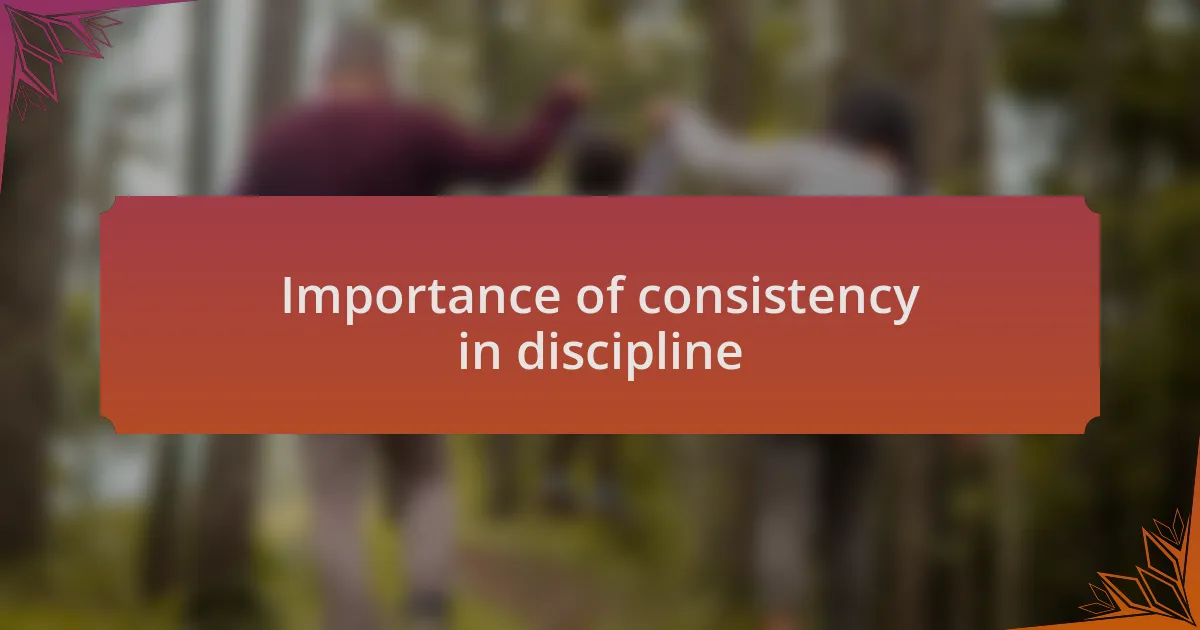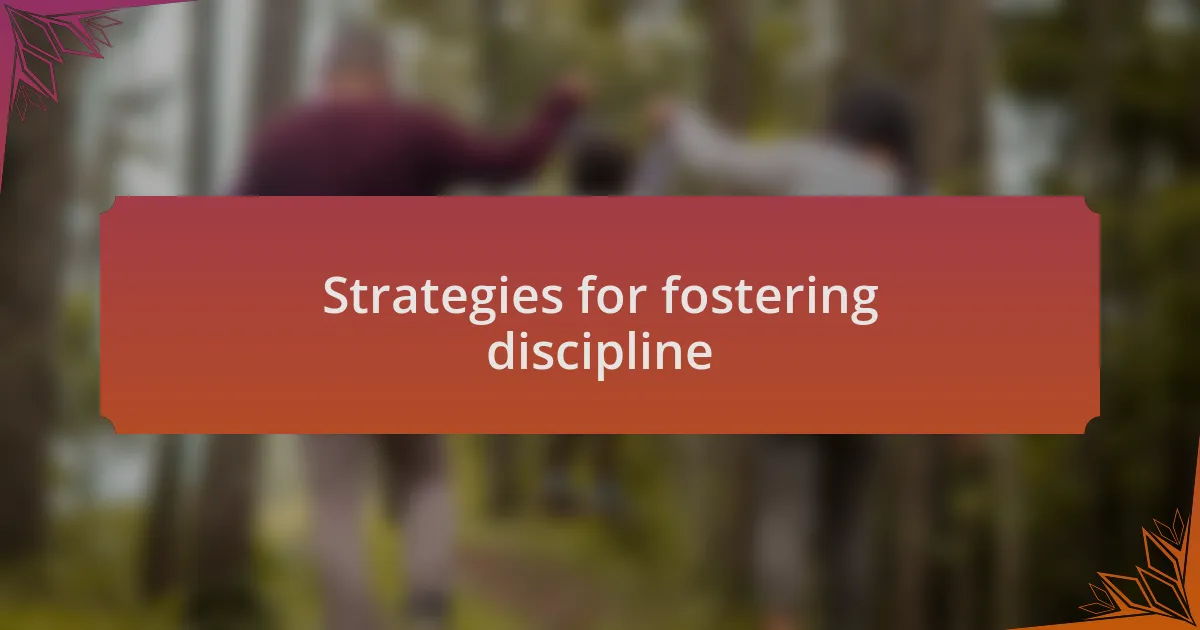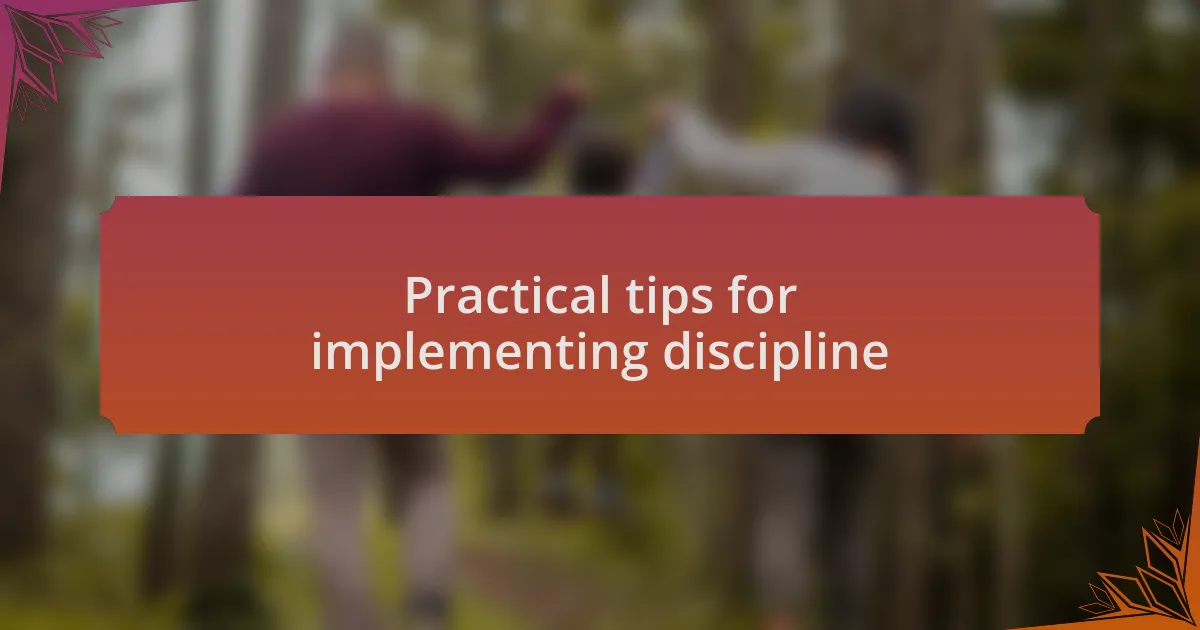Key takeaways:
- Discipline in parenting should focus on teaching emotional management and fostering growth rather than just enforcing rules.
- Consistency in discipline creates security and trust, reinforcing children’s understanding of boundaries.
- Effective discipline strategies include positive reinforcement, modeling desired behaviors, and maintaining open dialogue with children.
- Personal discipline is built through small, intentional habits and embracing setbacks as part of the learning process.

Understanding discipline in parenting
Discipline in parenting often feels like walking a tightrope; it requires a delicate balance between guidance and freedom. I remember a particularly challenging evening when my daughter threw a tantrum over a simple bedtime request. In that moment, I realized that discipline isn’t just about enforcing rules; it’s also about teaching children how to manage their emotions and responses.
When I think about discipline, it’s easy to conflate it with punishment, but that misses the mark. Instead, I’ve come to view it as an opportunity for growth. For instance, after a particularly tough week where my son struggled with sharing, we sat down to talk. I asked him how it felt when a friend didn’t want to play. His eyes lit up with understanding. That conversation transformed our approach to discipline, focusing more on empathy and less on reprimands.
It’s fascinating how discipline can serve as a foundation for a child’s understanding of boundaries and respect. I often ponder the question: Are we teaching our children to comply, or are we fostering their ability to make thoughtful choices? In my experience, when I prioritize connection over control, discipline becomes less of a chore and more of a collaborative effort where both my kids and I can thrive.

Importance of consistency in discipline
Consistency in discipline is crucial; it builds a sense of security for children. I remember the first time I set clear rules about screen time. Initially, my kids pushed back hard, but when I stuck to those boundaries daily, they began to understand that the rules were not arbitrary. Consistency reassured them, providing a predictable environment where they knew what to expect.
When I reflect on my parenting journey, I see that each time I wavered in enforcing consequences, the message was confusing. I learned that if I allowed a treat after a rule was broken, it not only undermined my authority but also taught my child that rules could be bent. Every time I steered back towards a consistent discipline approach, it was as if we reset our understanding. Have you ever noticed how children respond better when they know their parents mean what they say?
The emotional bond deepens when discipline remains steady. I vividly recall a tough day when my son threw a fit about chores. Instead of getting frustrated, I calmly reminded him of our agreement on responsibilities. In that moment, he may have been upset, but later, he thanked me for sticking to our routine. That small shift reinforced his trust in our structure and became a shared moment of growth rather than a battle of wills.

Strategies for fostering discipline
Strategies for fostering discipline can vary depending on each family’s unique dynamics, but one technique that has greatly worked in my experience is the power of positive reinforcement. I remember implementing a reward system for my child’s completed chores. When he received small accolades, like a sticker chart that blossomed into a fun family outing, it made him feel proud and motivated. Have you ever noticed how a simple acknowledgment can inspire your child’s behavior?
Another effective strategy involves modeling the behavior you want to see. I once caught myself reacting impulsively to a mess in our living room. Instead of handling it calmly, I raised my voice. The next day, I took a moment to gather my thoughts and showed my child how to tackle the mess together. It was a valuable lesson in accountability, combining discipline with teamwork. Isn’t it fascinating how children mirror our actions more than our words?
Lastly, creating an open dialogue around discipline can be transformative. I often sit down with my kids to discuss the rules we’ve established and encourage them to share their thoughts. Once, during a conversation about bedtime routines, my daughter expressed feeling overwhelmed by the timing. By listening to her feelings, we modified the schedule a bit, which not only respected her needs but also made her more willing to follow the rules. How often do you find that understanding your child’s perspective can reshape your approach to discipline?

My journey to personal discipline
There was a time in my life when personal discipline felt like a distant goal. I often struggled to maintain a routine, finding myself easily distracted by daily chaos. One day, while reflecting on this during an unusually quiet moment, I realized that small, intentional habits could lead to significant changes. Have you ever experienced that lightbulb moment where you recognize a better path forward?
As I began my journey, I focused on setting simple, achievable goals each day. I remember starting with just ten minutes dedicated to reading every morning. Over time, those ten minutes expanded my horizons and shaped my approach to the rest of the day. How empowering is it to see that even the smallest commitments can lead to profound growth?
The emotional aspect of building discipline was equally enlightening. There were days filled with frustration, especially when I’d slip back into old patterns. One evening, as I reflected on my journey, I realized that the struggle itself was part of the learning process. Acknowledging my setbacks allowed me to foster resilience and, ultimately, a stronger sense of self-discipline. Have you found that embracing imperfections can lead to greater strength and determination?

Practical tips for implementing discipline
To effectively implement discipline, start by creating an environment that supports your goals. For instance, I found that designating a specific space for focused activities minimized distractions. Have you noticed how a clutter-free zone can significantly enhance your concentration, especially when the demands of parenting can often pull your attention in various directions?
Another practical tip is to establish a routine that includes both consistency and flexibility. I remember the early mornings when my children were still waking up unpredictably. Adjusting my schedule to allow for their natural rhythms while still setting clear time blocks for my tasks was a game changer. How often do we forget that adapting our discipline strategy can foster not only our growth but also create a harmonious atmosphere at home?
Lastly, don’t underestimate the power of accountability. I’ve found that sharing my goals with a close friend or joining a parenting group can provide that extra push. When I shared my commitment to engaging with my kids through daily activities, I felt a stronger obligation to follow through. Have you ever experienced how a supportive community can empower you to stick with your plans?